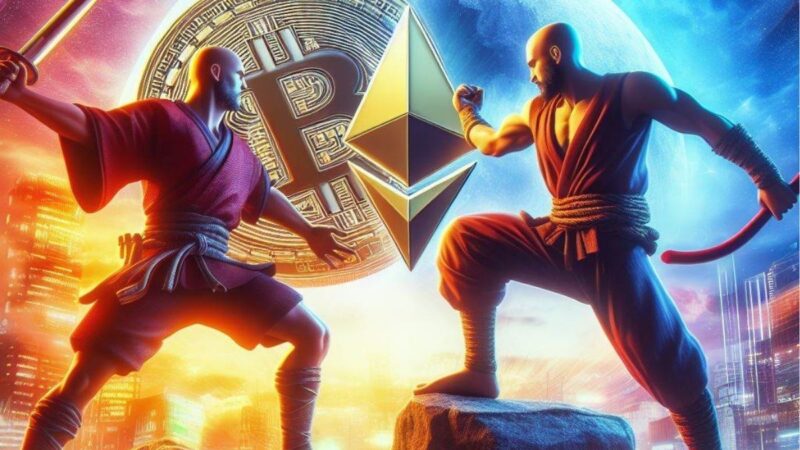In the world of cryptocurrency, two titans have emerged as front-runners over the years: Bitcoin vs Ethereum. While Bitcoin, the original digital gold, transformed the concept of money with its decentralized ledger and restricted quantity, Ethereum entered the fray with a more expansive ambition introducing the concept of smart contracts.
The difference between Bitcoin and Ethereum is a tale of two distinct cryptocurrency philosophies. One end of the spectrum views cryptocurrency as a store of value and a medium of exchange, while the other embodies it as a platform for decentralized applications.
Bitcoin’s proposition is simple yet powerful—create a finite digital asset that mimics the scarcity and durability of gold. Ethereum, on the other hand, aims to be the world’s financial computer, facilitating not just payments but also complex agreements and decentralized applications.
We will explore the differences between Bitcoin and Ethereum, understanding what makes them unique and valuable assets. From investment strategies to technological solutions advancements, the Bitcoin vs Ethereum battle is not just about who reigns supreme, but how each is shaping the future of finance and digital currencies.

Understanding Bitcoin
Before doing a deep dive into Bitcoin vs Ethereum, we need to understand the fundamental aspects of both of these cryptocurrency offerings.
First, let’s approach Bitcoin as a digital asset, or digital money, and not as a deposit of value as we will explain later. Think of Bitcoin as digital money that you can send to anyone, anywhere, without needing a bank. It’s like sending an email, but instead of a message, you’re sending money.
In very simple terms, Here is How Bitcoin Works:
Bitcoin is a form of digital currency that operates independently of a central bank. It’s a peer-to-peer system that allows anyone anywhere to send and receive payments. Instead of being physical money carried around and exchanged in the real world, Bitcoin transactions are recorded on a public ledger called the blockchain.
When you own Bitcoins, what you actually have is the private key, a secure digital code known only to you. This private key is stored in your digital wallet. The key is proof of your right to spend the Bitcoins from your wallet in any way that you choose. For example, you can choose to send any amount of Bitcoins that you own to another wallet owned by someone else. Your total Bitcoin wallet is just a digital collection of these private keys.
Transactions made with Bitcoins are sent to and from electronic wallets and are digitally signed for security. Everyone on the network knows about a transaction, which is reflected in the blockchain.
Bitcoin miners run complex computer rigs to solve complicated mathematical algorithms to confirm groups of transactions called blocks. Upon success, these blocks are added to the blockchain record, and the miners are rewarded with a small number of Bitcoins.
Now, let’s approach Bitcoin as a deposit of value. Bitcoin is often likened to gold, earning the nickname “digital gold”. This is due to the fact that it shares many similar attributes with the precious metal that has been a reliable store of value for centuries.
Both are scarce; gold is inherently rare on Earth and can only be obtained through extraction from physical mines. On the other hand, due to the digital mining process, Bitcoin is limited to 21 million coins. This “mining” scarcity helps cryptocurrencies such as Bitcoin to keep their value. In addition, both Gold and Bitcoin are durable; gold doesn’t wear out, and Bitcoin lives on a secure digital record that can’t be tampered with.

Bitcoin beats gold in portability and divisibility. It can be sent anywhere quickly and split into tiny parts (Satoshis) for small payments.
People have trusted gold for ages, and now Bitcoin is earning more trust as a new way to pay and invest. Both stand apart from total government control, making them attractive as secure assets.
Lastly, like gold, Bitcoin has become a way to save wealth, with its value growing over time. Even though there have been ups and downs during its limited lifespan, the overall trends in its growth trajectory demonstrate Bitcoin’s strength as a long-term investment.
Understanding Ethereum
Ethereum is a technology that’s home to digital money, global payments, and applications. The Ethereum community has built a booming digital economy, created bold new ways for creators to earn online, and introduced much more utility. It’s open to everyone, wherever you are located in the world – all you need is access to the internet.
Ethereum is similar to Bitcoin in that it’s a digital currency. However, it’s also different because it includes smart contracts, which are agreements that are automatically executed when certain conditions are met, without the need for a middleman. This means that Ethereum doesn’t just track transactions, it also programs them.
Smart contracts are like automatic rules that everyone agrees to follow, and once they’re set up, they can’t be changed. They’re used for all sorts of things, like creating new kinds of altcoins, running applications that can’t be shut down, and setting up organizations where everyone has a say in what happens.
The solutions that smart contracts provide are vast. They can be used to automate complex processes, reduce the need for trusted intermediaries, and provide a secure and transparent way to conduct transactions. This can lead to reduced costs, increased efficiency, and the creation of new opportunities for business and social interactions.

Similar to Bitcoin, Ethereum works by using blockchain technology. This technology is decentralized, meaning it’s not controlled by any one person or organization, and it’s secure because it’s very difficult to tamper with.
However, just as with banking or credit cards, hackers can cause havoc if they can get access to individual keys. It is important to make sure that keys are not shared with anyone other than those that you trust. Think of who you would share your bank account number with, the same applies to your digital keys and wallet.
Bitcoin vs Ethereum: The differences
Finally, let’s do a quick review and look at Bitcoin vs. Ethereum in the context of what each one offers and when it would be appropriate to use one over another.
Bitcoin is a form of digital currency that can be sent directly to anyone, anywhere in the world, without the need for a traditional bank. Therefore, for simplicity, one could compare Bitcoin to a regular currency such as a dollar or a Euro but only in digital form. The difference is that it functions outside the control of any central authority and enables global transactions. The essence of owning Bitcoin lies in possessing a private key, a secure digital code that is known only to you and your digital wallet.
Bitcoin transactions are verified by miners who use powerful computers to solve complex mathematical problems. Once these problems are solved, groups of transactions, known as blocks, are added to the public ledger, the blockchain.
Ethereum, on the other hand is a platform that hosts a variety of digital currencies, global transactions, and decentralized applications. It has fostered a thriving digital economy, offering innovative ways for creators to create more efficient applications and to earn online income by applying these applications.
Accessible to anyone with an internet connection, Ethereum is akin to Bitcoin as a digital currency but stands apart with its inclusion of smart contracts. These smart contracts are agreements that automatically execute when predefined conditions are met, eliminating the need for intermediaries.

In essence, while both Bitcoin and Ethereum utilize blockchain technology and emphasize decentralization, they cater to different needs. Bitcoin primarily serves as a store of value, whereas Ethereum, with its smart contracts, offers solutions for decentralized applications and transactions.
Hopefully, this clarifies the distinction between Bitcoin and Ethereum and aids in understanding their respective advantages.





